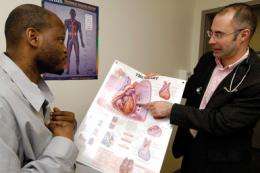New Clinical Trial Studies Heart Failure Therapy

(PhysOrg.com) -- A new clinical trial at UC Health University Hospital is looking at how cardiac resynchronization therapy (CRT) may help individuals with advanced heart failure who may not have been previously eligible for the treatment.
CRT involves the use of a specialized pacemaker to improve the electrical activation of the right and left ventricles in patients with heart failure.
UC Health electrophysiologists along with researchers at 125 study sites worldwide will see how this therapy impacts patient outcomes in subjects who experience heart failure due to malfunction of the left ventricle (left ventricular systolic dysfunction), those who have echocardiographic evidence of ventricular dyssynchrony—or decreased pumping function—and those who have a narrow QRS rate of less than 130 milliseconds.
The QRS duration on an electrocardiogram—a tool that measures and records the electrical activity of the heart—is an expression of the electrical activation of the ventricles and indicates cardiac mechanical function. If prolonged, it suggests decreased, abnormal contractility. This is also known as heart failure with ventricular dyssychrony.
"CRT has been recently included in the official guidelines for the management of heart failure subjects, but these guidelines currently still recommend a QRS duration of greater than 120 milliseconds as criteria for the prescription of CRT,” says Alex Costea, MD, lead investigator on the local study. "Previous randomized trials with CRT have been limited to subjects with a QRS duration of greater than 120-130 milliseconds, who represent only 28 percent of all subjects with chronic heart failure.
"However, more recent studies indicate QRS duration alone is an insufficient marker of dyssyncrony and a mediocre guide to treatment benefit of CRT. Thus, we believe that CRT treatment indications in heart failure subjects should be expanded.”
This randomized, double-blind study—called EchoCRT—will examine whether CRT in heart failure subjects with narrow QRS and ventricular dyssyncrony will significantly reduce death or hospitalization for worsening heart failure. Researchers will evaluate more than 1,200 patients for six months.
"Patients will still have implantable cardioverter defibrillators as backup to avoid potentially fatal abnormal heart rhythms,” Costea says. "Prescreened subjects will have baseline testing and an enrollment echocardiogram with advanced complex measurements and interpretation to determine whether they meet criteria.
"Heart failure claims more than 300,000 lives annually in the United States. We hope that expanding the use of CRT will make a difference.”














